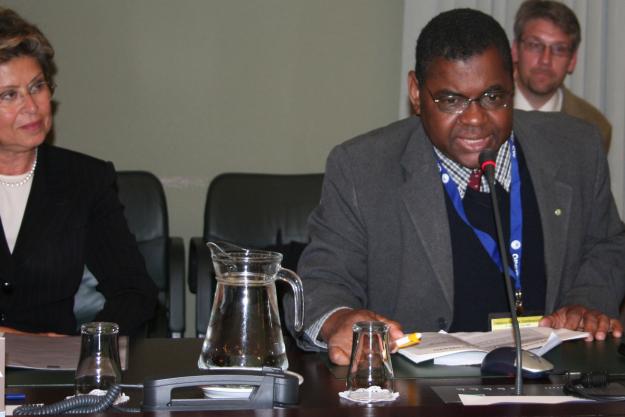
A moment of the presentation “EU Action in Support of OPCW Activities; Effective multilateralism in practice”, held at the OPCW on 14 April 2008
The Organisation for the Prohibition of Chemical Weapons (OPCW), the watchdog agency responsible for implementing the Chemical Weapons Convention (CWC), held a special event in The Hague on 14 April 2008 highlighting the European Union’s support to OPCW’s work in universality, national implementation and international cooperation around the CWC.
The event was held at OPCW headquarters on the sidelines of the Second Review Conference, a major gathering of the OPCW’s 183 Members States that is held every five years to assess progress toward the goals of the Convention and provide strategic guidance. Presiding at the event were Ambassador Dr Tea Petrin, Slovenia’s Permanent Representative to the OPCW; Ambassador Rogelio Pfirter, Director-General of the OPCW; and Ms Annalisa Giannella, the Personal Representative on non-proliferation of Javier Solana, the High Representative for the Common Foreign and Security Policy.
“The Second Review Conference of the CWC is one of the priorities of the Slovenian EU Presidency in the field of disarmament. We are pleased to present to you some of the projects of the EU Joint Action, which is an immediate and practical application of the EU Strategy against the Proliferation of Weapons of Mass Destruction,” said Ambassador Dr Petrin.
“Our cooperation with the European Union provides critical support at international, regional and national levels toward full implementation of the Chemical Weapons Convention,” Director-General Pfirter said.
Ms Giannella said, “The EU-OPCW cooperation illustrates the important concept that lies at the heart of the EU’s non-proliferation strategy and of the EU Common Foreign and Security Policy – effective multilateralism.”
The EU’s support, totalling more than EUR 5 million, was channelled within the framework of the EU Strategy against Proliferation of Weapons of Mass Destruction and began in December 2004. It is financing a number of key activities, including:
• Support for regional, sub-regional and bilateral activities to increase membership of the OPCW with a view to achieving universality;
• Capacity-building grants for national implementation measures envisaged by the Convention;
• Strengthening of Member States’ capacities to respond to chemical weapons attacks and develop assistance and protection programmes;
• Establishment of a freely accessible database to allow national authorities and industry an easy identification of scheduled chemical under the Convention;
• Support for a highly successful Industry and Protection Forum held in November 2007 in the framework of the OPCW’s 10th Anniversary; and
• Support for visits to chemical weapons destruction facilities and construction sites to monitor progress toward meeting extended destruction deadlines.
The Hague event featured presentations by beneficiaries of the EU’s support from Algeria, Bangladesh, Burkina Faso, Finland, Italy, Sri Lanka and Uganda.
